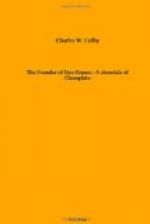Thus there are certain large aspects of Champlain’s character that stand forth in the high light of deed, and do not depend for their effect either upon his own words or those of others. But when once we have paid tribute to the fine, positive qualities which are implied by his accomplishment, we must hasten to recognize the extraordinary value of his writings as an index to his mind and soul. His narrative is not an epic of disaster. It is a plain and even statement of great dangers calmly met and treated as a matter of course. Largely it is a record of achievement. At points where it is a record of failure Champlain accepts the inevitable gracefully and conforms his emotions to the will of God. The Voyages reveal a strong man ’well four-squared to the blows of fortune.’ They also illustrate the virtue of muscular Christianity.
At a time which, like ours, is becoming sated with cleverness, it is a delight to read the unvarnished story of Champlain. In saying that the adjective is ever the enemy of the noun, Voltaire could not have levelled the shaft at him, for few writers have been more sparing in their use of adjectives or other glowing words. His love of the sea and of the forest was profound, but he is never emotional in his expressions. Yet with all his soberness and steadiness he possessed imagination. In its strength and depth his enthusiasm for colonization proves this, even if we omit his picture of the fancied Ludovica. But as a man of action rather than of letters he instinctively omits verbiage. In some respects we suffer from Champlain’s directness of mind for on much that he saw he could have lingered with profit. But very special inducements are needed to draw him from his plain tale into a digression. Such inducements occur at times when he is writing of the Indians, for he recognized that Europe was eager to hear in full detail of their traits and customs. Thus set passages of description, inserted with a sparing hand, seemed to him a proper element of the text, but anything like conscious embellishment of the narrative he avoids—probably more through mere naturalness than conscious self-repression.
From Marco Polo to Scott’s Journal the literature of geographical discovery abounds with classics, and standards of comparison suggest themselves in abundance to the critic of Champlain’s Voyages. Most naturally, of course, one turns to the records of American exploration in the sixteenth and seventeenth centuries—to Ramusio, Oviedo, Peter Martyr, Hakluyt, and Purchas. No age can show a more wonderful galaxy of pioneers than that which extends from Columbus to La Salle, and among the great explorers of this era Champlain takes his place by virtue alike of his deeds and writings. In fact, he belongs to the small and distinguished class of those who have recorded their own discoveries in a suitable and authentic narrative, for in few cases have geographical results of equal moment been described by the discoverer himself.




